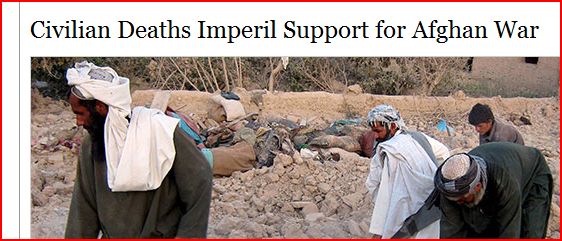Fair.org (via Alas a Blog) points out that the news media has consistently framed the recent U.S. killing of dozens of Afghan civilians as “bad PR.” Consider these headlines:
Wall Street Journal

Washington Post

New York Times

Fair summarizes the coverage:
Early reports of a massive U.S. attack on civilians in western Afghanistan last week (5/5/09) hewed to a familiar corporate media formula, stressing official U.S. denials and framing the scores of dead civilians as a PR setback for the White House’s war effort.
…
The New York Times reported that civilian deaths “have been a decisive factor in souring many Afghans on the war.” As CBS Evening News anchor Katie Couric put it (5/6/09), “Reports of these civilian casualties could not have come at a worse time, as the Obama administration launches its new strategy to eradicate the Taliban and convince the Afghan people to support those efforts.” Other outlets used very similar language to explain why the timing was “particularly sensitive” (Washington Post, 5/7/09) or “awkward” (Associated Press, 5/7/09) for the Obama administration.
The ease with which these deaths can be framed as a problem for the U.S. is a good example of how we can dehumanize the Other. We clearly do not identify with the victims or their loved ones when the pain and suffering we leave in our wake is made invisible so easily.

Comments 5
Fernando — May 12, 2009
Not even sure if this is dehumanizing, it is simply not caring from the get go. I had never realized this when reading things like that. Though I think it would be interesting to see if the same newspapers have previously published stories showing, what is often called, the human side of war. Pieces talking about the suffering of those civilians.
Allan — May 13, 2009
Innocent people are dying, and the media and government treat this as simply an obstacle in the way of politics. Disgusting.
(On the bright side, I'm really happy to see something of substance on this blog. More of the same, please. Less of the "Dell's new website uses pastel colors BURN THEM!!!1!!eleven!!!!")
Nenya — May 14, 2009
Thank you. Many news reports on the war(s) make me twitch for just this reason. I want to say to the journalists, "You bastards, what's more important here, that people died or that talking about it doesn't make our government look good? What the fuck? People are dying, and it's more important that the ones who killed them don't get bad PR??"
Dubi — May 17, 2009
Assumption: people die in wars, and civilians are more likely to die in wars fought against non-armies (e.g., Afghanistan).
Assumption: Obama's recent moves aim at ending the fighting, thus preventing further deaths.
Result: the incidental deaths of a certain number of civilians now may mean that many more would die in the future, because Obama's talks would fail due to mounting emotions. So, yes, I think in the long run, the reports ARE right in seeing the failure of the talks as "more significant" (in a purely utilitarian body count manner) than the actual deaths.
But by all means, do keep on with your holier-than-thou tut-tutting. It's quite amusing. I have no doubt that you thoroughly grieve for every life lost everywhere on the planet, unlike those bastard journalists.
(And no, it's not a PR thing. Nobody saw any headlines reading "Death if Iraqis in Iraq makes Bush look bad" during the day. But they DID read "US death-toll in Iraq lowering Bush approval ratings". Maybe the journalists hate US soldiers too!)
SabinaHolt — March 13, 2024
Feel free about knowing something new on solar energy, solar power and, of course, solar panels heartlandrenew.org